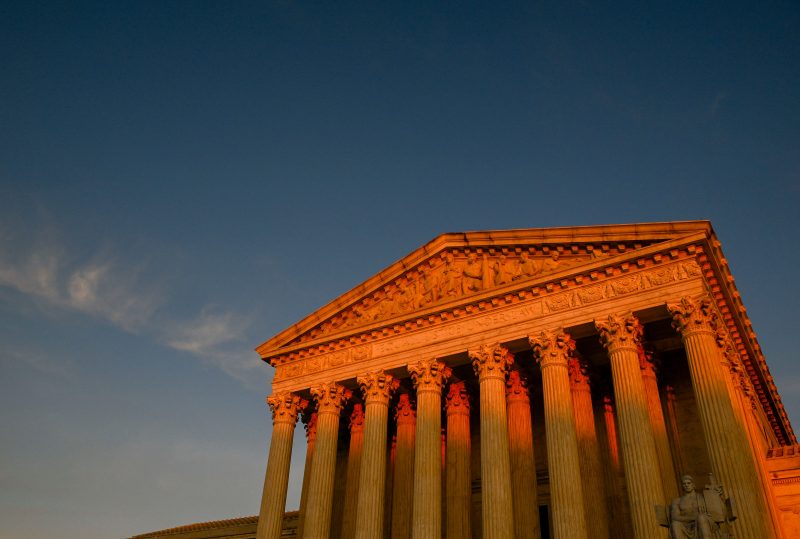
Supreme Court hears free-speech challenge to portion of immigration law
The Supreme Court on Monday seemed divided over whether a federal law that makes it a crime to encourage undocumented immigrants to stay in this country might be so broad it would jeopardize charitable groups that feed the hungry or a family’s plan to have a grandmother keep living nearby.
The U.S. Court of Appeals for the 9th Circuit found the decades-old law “overbroad and unconstitutional” because it potentially outlawed more free speech than needed to meet the law’s goals.
And during their nearly 1 1/2-hour hearing Monday, some justices had no trouble pinging Deputy Solicitor General Brian H. Fletcher, representing the Justice Department, with examples of who might fall on the wrong side of an immigration law that penalizes a person “who encourages or induces an alien to come to, enter, or reside in the United States.”
“I think we’re going to talk to the grandmother who lives with her family who’s illegal or who are noncitizens,” said Justice Sonia Sotomayor. “The grandmother tells her son she’s worried about the burden she’s putting on the family, and the son says, ‘Abuelita, you are never a burden to us. If you want to live here — continue living here with us, your grandchildren love having you.’ Are you — can you prosecute this?”
Justice Brett M. Kavanaugh wondered about charitable organizations that say there is a “threat of prosecution for them for providing food and shelter and aid and recommending people for scholarship and all the rest.” Kavanaugh, who has served meals to homeless people near the Supreme Court, added: “They seem to have a sincere concern about that and that it will deter their kind of everyday activities.”
Justice Elena Kagan also pressed Fletcher. “What happens to all the cases where it could be a lawyer, it could be a doctor, it could be a neighbor, it could be a friend, it could be a teacher, it could be anybody, says to a noncitizen, ‘I really think you should stay?’ What happens to that world of cases?”
Fletcher acknowledged there would be hard cases. But he said the 9th Circuit got it wrong by issuing a ruling on the case at hand — involving a man who defrauded the undocumented — and “giving the words ‘encourage’ and ‘induce’ their broadest possible meaning and sweeping in wide swaths of protected speech.”
“Our position here is that the statute need not and should not be read that way,” he added.
Instead, the words “encourage and induce” in the law should be read more like intentionally seeking to aid and abet a crime, Fletcher said.
The case the justices were considering provided Fletcher’s example. Helaman Hansen operated an organization called Americans Helping America Chamber of Commerce. Nearly 500 noncitizens who had overstayed their visas paid the organization between $550 and $10,000 on the false promise they could gain citizenship through adult adoption, which the law does not allow. The government charges that Hansen’s organization made more than $1.8 million from the scheme.
Hansen was found guilty in 2017 of mail fraud, wire fraud and two counts of encouraging or inducing unlawful noncitizens for private financial gain. The American Civil Liberties Union and a public defender represent him as he challenges those two convictions, saying the law violates the First Amendment.
If the court wants to make sure people aren’t wrongly prosecuted under the law, Fletcher said, justices should write in their opinion “that the statute has the limits that we say it has, in ways that we won’t be able to get around in the future.”
Some conservative justices said Hansen’s crimes were quite different from the examples of family members and well-meaning charities.
“It is a little awkward, tough, that this case comes up in a posture with Mr. Hansen, who I don’t think anybody could say he’s been chilled from speaking,” said Justice Neil M. Gorsuch. “I mean, he’s had no problem soliciting people here in this country and defrauding them to the tune of lots and lots of money … He has victimized these people, and it may be a poster child for a situation in which the underlying offense might be modest, but you might want to criminalize it because he’s taking advantage of very vulnerable people.”
Hansen’s attorney, Esha Bhandari, agreed Hansen victimized his clients, but said nothing about the case before the justices would disturb his fraud convictions and sentence of 20 years.
“But under the encouragement provision, the government did not have to prove that he lied to anyone, that he deceived anyone, that he engaged in any false speech,” she said. “All they had to show was that he encouraged or induced people.”
Justice Amy Coney Barrett said that it was easy to come up with hypotheticals about how the law might inhibit speech but that there are few real-life examples.
“No one’s pointed out there are charitable organizations, to use Justice Kavanaugh’s hypothetical, that are not giving food and shelter and resources or that lawyers are afraid to give advice,” she said. “I mean, the statute’s been on the books for a long time. And … there’s an absence of prosecutions. There is also an absence of demonstrated chilling effect.”
Bhandari countered that the court has never required a demonstration that a law chilled speech to find it overbroad.
The Supreme Court took up a nearly identical case three years ago, also from the 9th Circuit. But the justices eventually decided the First Amendment question was not before them because it had not been raised by the parties in the case.
Monday’s case is United States v. Hansen.
